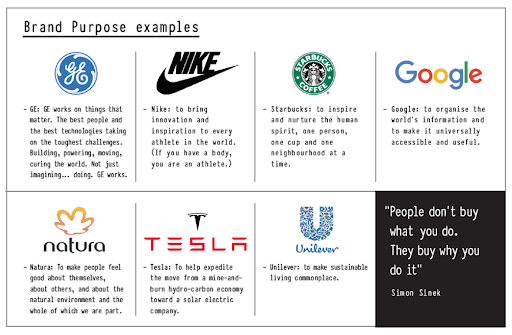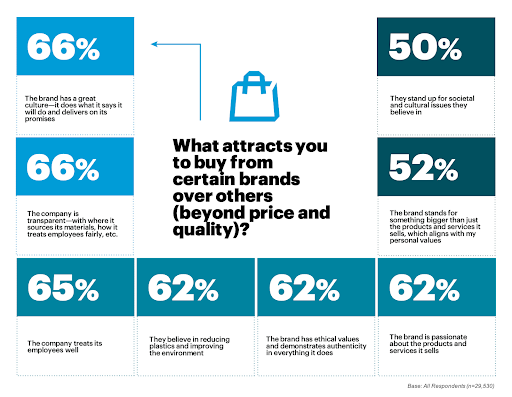Power Of Brand Purpose: Why It Counts More Than Ever In 2024
Uncover the crucial role of brand purpose in 2023. Learn why it's more vital than ever and how it can impact your business's success. Read now.
The tides of modern business are shifting. These days, when consumers look for a business to fulfill their requirements - a product or a service - they genuinely care about this brand's impact on the world around them.
Therefore, if you want to take your business to the next level, it's imperative to develop a sense of purpose that gives a potential customer something to connect with.
By developing and adopting a brand purpose, you can drive change in your industry while making a name for your brand.
But the question is, what is the brand's purpose, and why is it so important?
In this piece, we'll be walking you through exactly how to define a brand purpose, how you can develop a purpose strategy and how your business can connect with your audience.
1. So, what is brand purpose?

Your purpose should encapsulate everything you do as a business. It should define how your customers, employees, and the overall market responds to your brand - just like the examples above from major brands.
Although to some extent, every brand has a purpose, authentic brand purpose means creating a deliberate strategic roadmap that defines your existence beyond the means to deliver profitability.
Simply put: your brand purpose is your means to make money and meet the needs of a specific community or solve a problem.
So, rather than trying to be all things to everyone, you need to remove the unnecessary padding and understand why you exist in the first place and what you're attempting to accomplish in this space.
While it's true that only some things you do will necessarily resonate with the general customer, they will allow you to connect with your current audience and help you form stronger long-term relationships.
The right brand purpose strategy can help inform everything you do, from your marketing strategies to the way you manage your customers.
2. What is the modern customer looking for in your brand?

Modern consumers are no longer solely concerned with the best value for money. Over the years, as more businesses have focused their efforts online, it takes a consumer mere seconds to find a product or service and a multitude of different businesses that can offer it to them.
This market saturation means that consumers are yearning to connect with a brand that has a purposeful affinity with their customers, which can keep them returning.
Consumers are very enlightened about corporate responsibility and will place great importance on choosing a brand that shares the same values as their own.
According to recent research, 66% of consumers were more likely to buy from a brand that had a great culture and delivered what it promised, and 52% say they are more likely to buy from certain brands over others if these brands stand for something bigger than just products and services it sells.
This further backs up the point we made earlier in this piece, you can never be all things to all people, but it's crucial to ensure that you are at least appealing to your target demographics.
Statistics show that consumers want brands to utilize their sway and influence for good causes, and three-quarters of them are very willing to part ways with a brand that they feel is no longer sharing the same values that they hold dear to them.
This could include everything from funneling portions of profits into charities to creating opportunities to improve the natural environment or reaching out to the local community - generally speaking, when you care, your audience will care about you.
3. Why is your brand purpose crucial?
Your brand purpose is crucial for a number of reasons, and in this section, we'll be covering precisely why you should consider formulating a brand purpose strategy.
Increased brand loyalty
A compelling brand purpose can not only capture the attention of your audience but also capture their imagination too, which means they are far more likely to remain loyal to your brand.
Brand loyalty creates what is known as "brand advocates" that will sing your praises, which expands your audience pool exponentially.
Entice & retain talent
Contrary to popular belief, formulating a brand purpose strategy is not just for the benefit of clients and customers.
In fact, according to LinkedIn's employer brand statistics, 75% of job seekers will consider a prospective employer's brand before they even apply for a job.
This tells us that with a strong brand purpose strategy, you'll be able to attract the best talent in your industry with similar principles and value systems to your own, making growing and maintaining the business much easier because you're holding on to the very best people.
Connect with your audience
Strong brand purpose can bring your customers behind the curtain of your business, showing them how your business operates in a more personal, emotional and meaningful way.
This connection, in many cases, can last for many years, and in some cases being far more open and conscientious will create lifetime customers.
Acts as your shining light
An effective brand purpose will act as a North star for all your business decisions.
When everyone within your business truly understands the brand's purpose, it gives everyone a guiding point to help them make decisions and drive the business forward.
This means everyone knows exactly what is expected of them, and every decision taken remains in line with the principles and guidelines of the brand.
Leg up on the competition
Many businesses, particularly larger organizations or corporations, are typically very guarded in what they share and when.
However, to give yourself a unique identity in the market, open yourself up to your customer base, and you'll have a tremendous opportunity to steal a march on your competition.
4. Understanding your visions, missions & values

A brand purpose, the very reason your business exists beyond your ability to generate revenue, merges a range of ideals to create a multifaceted personality for the brand that people are proud to associate with.
However, before putting one together, there are a few related factors that you'll need to consider. While there are differences between them all, they will all intertwine with one another and give you a solid foundation for creating your brand purpose.
Brand vision
Brand vision means what you plan to do in the future and helps you understand the impact of your activities on the environment, people and wider communities too.
These days, customers like to know they're doing business with a company that is planning for the future and understands how they might be able to alleviate problems in the world.
Brand mission
Brand mission identifies the goals and objectives you'll set to create a version of this future you envision.
Brand values
Your values should be a beacon to everyone around you, clearly illuminating what you stand for and what principles you will hold yourself to internally.
Your values will form the basis of your vision, mission and ultimately your purpose, too, so it's a crucial step.
How do I put together a brand purpose strategy?
Understanding your brand's missions, values, and vision is only a small step toward creating a genuinely recognizable purpose-driven brand.
Remember, your brand purpose strategy should be put together to truly define what you stand for in the eyes of your employees and your external audience.
So, how do you put together a strong brand purpose strategy?
Ask yourself the right questions
To start formulating your brand purpose strategy, you must ask yourself some crucial questions. While these may sound somewhat rudimentary, taking the time to think about them may produce some answers you still need to consider.
For example:
- Why Did I Start My Business?
- Why Do I Do What I Do?
- What Inspires My Customers?
- How Can My Brand Improve the World?
- What Issues Am I Passionate About Helping to Solve?
- What Are We Doing to Disrupt Our Industry?
Once you've gathered some critical information about the basics of your business, you can formulate more concise questions that will eventually become your brand purpose.
This may look something like this:
What do we intend to do?
We all know that a business is just that, a business that means its primary focus is to generate revenue. However, the modern consumer is aware that profit can come at the expense of things like the environment, vulnerable community sections and many more.
In practice, your business must ensure that it can make money and be seen as a business that fights the good fight through brand activism.
A strong brand purpose should encapsulate how you intend to improve the world while making the most of business opportunities.
Why do we intend to do it?
Why are you taking this particular course of action as opposed to another?
Identifying why you intend to travel down a specific route will answer the why behind your being, which is likely one of the first questions a conscientious consumer will ask.
How do we intend to do it?
Go back a few steps and think about your competitors.
Then truly consider what you do, exactly how you do it differently, and how you'd like your solutions to stand out in a crowded marketplace.
It's no longer good enough to be another face in the crowd today.
Bringing together your brand purpose strategy
Now that you've compiled and answered these (or similar) questions, you can analyze your answers, and you should begin to see very familiar themes, words, and other patterns within what you've created.
These alone might be enough to formulate your brand purpose. Still, you can continue drilling down to the very granular elements to create something that will eventually become synonymous with your brand.
Once you've done this, remember to share it with your team. After all, they are on the front line of the business every day, so they will have important insights and feedback on how your processes might help to shape your brand further.
Takeaways
When creating the best brand purpose strategy for your business, ask yourself some of the simple questions about your organization and yourself, and you'll find that the answers will begin to construct a brand purpose.
Consider what you're offering and what the world needs to solve key issues, and identify precisely what your audiences want to see you doing and talking about.
Once you've hit upon what separates you from the rest, you can start developing your recruitment, internal comms, marketing and social media strategies to revolve around this purpose.
After you do this, expect increased loyalty to your brand, a committed and principled team with the same value system as yours, and a noticeable change in the world around you.


